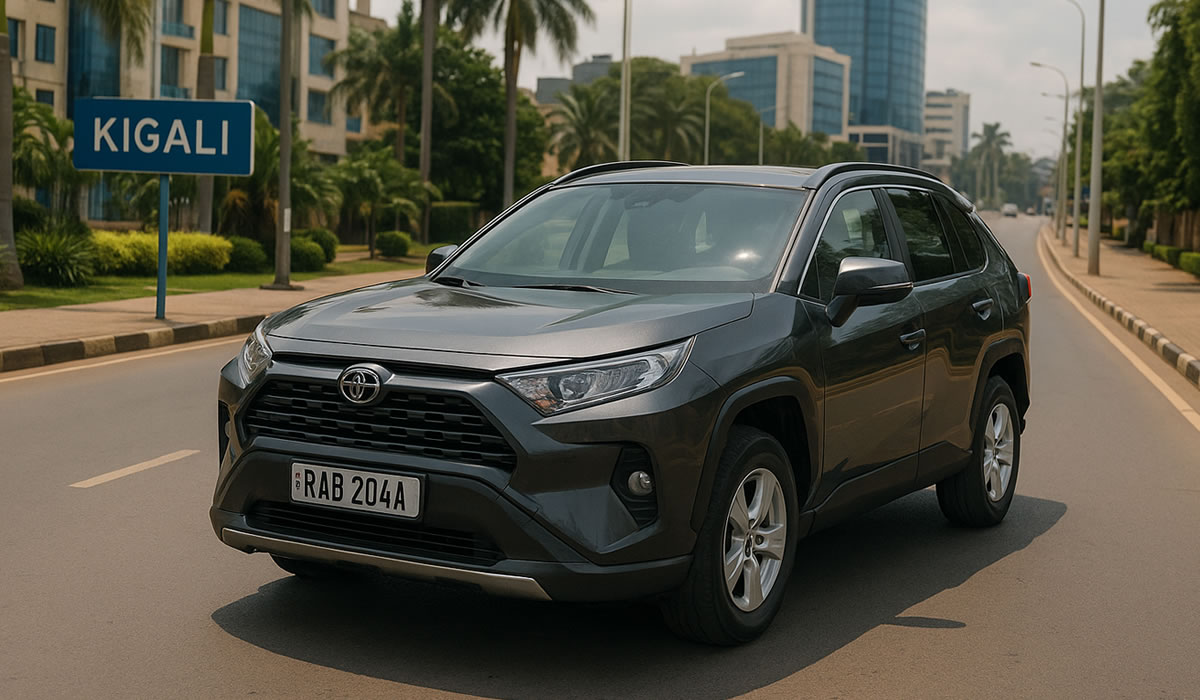As Rwanda becomes increasingly popular with tourists and business travelers alike, many visitors consider renting a car as a convenient and flexible way to explore Rwanda. Whether you’re planning a gorilla trek in the misty mountains of Volcanoes National Park, a wildlife safari in Akagera National Park, or a business trip in Kigali, renting a car can significantly enhance your experience. This article offers a detailed overview of car rental in Rwanda, including types of vehicles, rental costs, driving conditions, necessary documentation, and tips for a smooth journey.

Why Rent a Car in Rwanda?
Car rental in Rwanda offers travelers a number of advantages. First and foremost, it provides freedom and flexibility. Public transportation in Rwanda, while improving, is still limited in terms of routes and reliability, especially outside Kigali. With a rental car, you can travel at your own pace, stop for scenic views, visit off-the-beaten-path destinations, and customize your itinerary according to your interests.
Additionally, many of Rwanda’s top attractions are located in remote areas. For example, Volcanoes National Park, where visitors can trek to see the endangered mountain gorillas, is about a 2.5-hour drive from Kigali. Nyungwe Forest National Park, a prime spot for chimpanzee tracking and canopy walks, is roughly 6–7 hours away. Without a private vehicle, reaching these areas would be logistically difficult and time-consuming.
For business travelers or those attending events and conferences in Kigali, a rental car offers convenience, especially for moving between meetings or exploring Kigali’s growing number of restaurants, shops, and cultural sites in your free time.
Types of Rental Vehicles
Rwanda’s car rental companies offer a wide range of vehicles to suit different travel needs and budgets. The type of vehicle you choose will depend on your itinerary, group size, and the kind of terrain you’ll be covering.
- 4×4 Vehicles (SUVs): These are the most popular choice for tourists. Rwanda’s national parks and rural areas often involve dirt roads, steep hills, or muddy conditions, especially during the rainy seasons. A four-wheel-drive vehicle ensures better traction and comfort in these situations. Popular models include the Toyota Land Cruiser, Prado, and RAV4.
- Sedans and Compact Cars: If you’re staying mostly within Kigali or driving short distances on paved roads, a compact car or sedan may be sufficient. These vehicles are more fuel-efficient and typically cheaper to rent.
- Vans and Minibuses: For larger groups or families, minivans or safari vans with pop-up roofs are available. These vehicles are great for group safaris or extended road trips and often come with a driver-guide.
- Luxury Vehicles: Some rental agencies also offer high-end vehicles for business travelers, VIPs, or special occasions such as weddings.
- Motorbikes and Scooters: For experienced riders and solo travelers, motorbike rentals are an option in Kigali and a few other towns, though they are less suited for long-distance travel.
Car Rental Options: Self-Drive vs. With a Driver
Travelers in Rwanda can choose between self-drive rentals and rentals with a driver. Each option has its advantages:
- Self-Drive: Self-driving offers independence and privacy. You have full control over your schedule and can explore at your own pace. However, it requires a valid driver’s license and a good understanding of Rwandan driving rules and road conditions. This option is best for confident drivers accustomed to driving in African or developing-country settings.
- With a Driver: Renting a car with a driver is a popular choice in Rwanda, especially for tourists. A local driver can navigate challenging roads, handle directions, and offer insights about the country, culture, and wildlife. Many driver-guides are also trained in basic first aid and fluent in English and French. This option provides peace of mind and allows you to focus on enjoying the journey.
Rental Costs and Inclusions
Car rental prices in Rwanda vary depending on the type of vehicle, duration, and whether you choose self-drive or driver-assisted rentals. As of 2024–2025, typical rates are:
- SUV 4×4 (self-drive): $70–$120 per day
- SUV 4×4 (with driver): $100–$150 per day (driver’s allowance included)
- Sedan (self-drive): $40–$70 per day
- Minivan or Safari Vehicle: $120–$200 per day
- Luxury Car: $150–$300 per day
Prices often include comprehensive insurance, unlimited mileage, and 24/7 roadside assistance. However, fuel is usually not included and must be paid separately by the renter. Some agencies offer airport pick-up and drop-off, while others may charge extra for delivery outside of Kigali.
Fuel Availability and Costs
Fuel is widely available in urban areas and along major highways, though it can be sparse in remote regions. Always ensure your tank is full before venturing into rural areas. Fuel prices are regulated by the Rwanda Utilities Regulatory Authority (RURA) and, as of early 2025, hover around 1.45–1.60 USD per liter for petrol and diesel.
Required Documents for Car Rental
To rent a car in Rwanda, you’ll need the following documents:
- Valid Driver’s License: Most rental agencies accept foreign licenses, especially those in English or French. For self-drive rentals, some may require an International Driving Permit (IDP), particularly for non-English licenses.
- Passport or National ID: A copy of your identification will be required for security and registration.
- Credit Card: Most agencies require a credit card for deposit purposes, although some may accept cash deposits.
If you’re renting with a driver, the documentation process is usually simpler, and an ID and payment method may suffice.
Driving in Rwanda: Road Conditions and Rules
Driving in Rwanda is relatively safe compared to many neighboring countries. The road network is well-maintained, especially between major cities and tourist destinations. Kigali, in particular, boasts clean, organized roads and visible signage. However, there are some important considerations:
- Drive on the right-hand side of the road.
- Speed limits are generally 40–60 km/h in urban areas and 80–100 km/h on highways.
- Seatbelts are mandatory for drivers and all passengers.
- Mobile phone use while driving is prohibited unless you’re using a hands-free system.
- Drunk driving is strictly enforced and carries serious penalties.
- Speed cameras and traffic police are common in Kigali and on main roads.
In rural areas, roads may be unpaved, narrow, or hilly, requiring extra caution. During the rainy seasons (March–May and October–November), some roads may become muddy and difficult to navigate without a 4×4 vehicle.
Parking and Security
Parking in Kigali is widely available and often supervised. Many hotels, malls, and office complexes offer secure parking. In smaller towns or rural areas, parking is usually informal but generally safe, especially if you are with a driver or using local accommodation.
Car theft is rare in Rwanda, but it’s still advisable to lock your vehicle and avoid leaving valuables inside, especially in unattended areas.
Insurance and Roadside Assistance
Most rental vehicles in Rwanda come with comprehensive insurance, covering theft, collision, and third-party liability. However, you should verify the policy details, such as the deductible/excess fee and what is or isn’t covered (e.g., undercarriage or tire damage).
Some credit cards also offer car rental insurance benefits check with your provider before you travel.
Reliable agencies also offer 24/7 roadside assistance, an essential service in case of breakdowns, flat tires, or emergencies, especially in remote areas.
Tips for a Smooth Car Rental Experience
- Book in advance: Especially during peak tourist seasons (June–September and December–February), rental demand is high. Booking ahead ensures availability and better rates.
- Inspect the car: Before driving off, inspect the vehicle thoroughly for existing damage and ensure everything (lights, brakes, tires, AC) works properly. Take photos or videos as documentation.
- Understand the contract: Read the rental agreement carefully and ask about fuel policy, mileage limits, late return fees, and emergency contacts.
- Know your route: Download offline maps or use GPS. In remote areas, phone signals can be weak.
- Drive cautiously: Be mindful of pedestrians, cyclists, and animals, especially in villages or near national parks.
Renting a car in Rwanda is one of the best ways to explore the country’s incredible diversity—from its bustling capital to its tranquil lakes, rich wildlife, and towering volcanoes. With improving road infrastructure, a wide selection of vehicles, and an increasing number of professional rental agencies, car rental in Rwanda has become accessible and efficient for both leisure and business travelers.
Whether you opt for a self-drive adventure or the comfort of a knowledgeable driver-guide, having your own vehicle allows you to experience Rwanda on your own terms. Just make sure to plan ahead, choose the right vehicle for your needs, and familiarize yourself with local driving regulations. With the right preparation, your road trip across Rwanda is sure to be a safe, convenient, and unforgettable journey.

